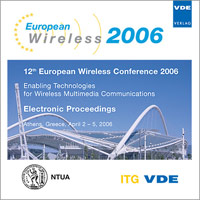Conception of a Relay Capable Multi-Mode MAC Protocol
Conference: European Wireless 2006 - 12th European Wireless Conference 2006 - Enabling Technologies for Wireless Multimedia Communications
04/02/2006 - 04/05/2006 at Athens, Greece
Proceedings: European Wireless 2006
Pages: 5Language: englishTyp: PDF
Personal VDE Members are entitled to a 10% discount on this title
Authors:
Otyakmaz, Arif; Pabst, Ralf; Schinnenburg, Marc; Berlemann, Lars (ComNets, RWTH Aachen University, Faculty 6, Aachen, Germany)
Abstract:
In recent years the wireless communication has increased rapidly. The main reason for this development is the steadily increasing demand for speech services. For the future it is expected that various types of data services will arise and that the demand for data services will be much higher than for speech services. These data services will require a ubiquitous mobile radio system with high data rates. This can be realised by a network deployment with a relative high density of Base Stations. But this is economically not reasonable, since the costs for connecting Base Stations to the fixed core network would be immense. Hence, to realise a cost effective ubiquitous mobile radio system, an extension of the coverage area of a Base Station is necessary. This can be achieved by using Relay Nodes which serve as Base Stations for User Terminals which are out of the coverage area of a Base Station and which are not wired connected to the fixed network, but wireless via a Base Station. User Terminals and Relay Nodes will have to face different environments, e.g. Line of Sight vs. Non-Line of Sight channel conditions or shortrange/ low-mobility vs. wide-area/high mobility. To facilitate a system that suits such a variety of scenarios, this paper proposes a multi-mode protocol which supports different modes for the different arising communication environments. For short range communication this is the Time Division Duplex-mode and for the wide area communication it is the Frequency Division Duplexmode.


